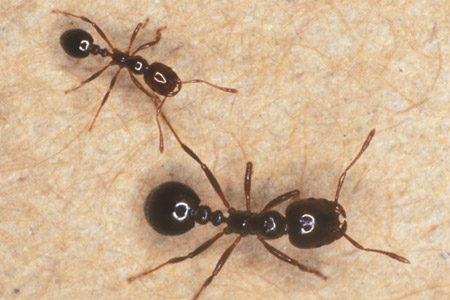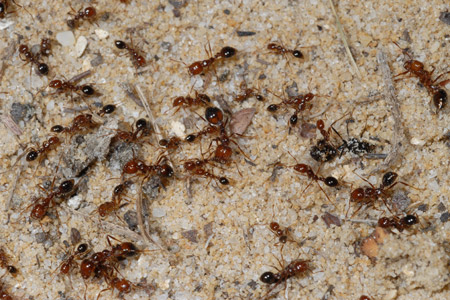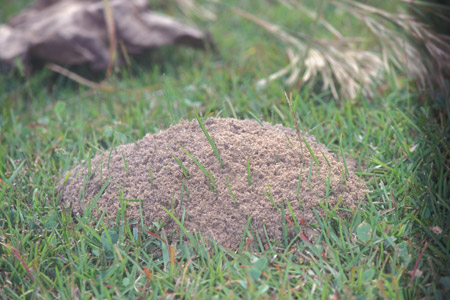Active Seasons




Fire Ant Appearance and Size Facts
Fire ants belong to the Solenopsis Genus and are characterized by their reddish-brown coloration, aggressive behavior, and painful stings. Their ability to form large colonies and their aggressive foraging patterns make them a formidable pest in the region and across the United States. In Florida, the two most common species of fire ants in Florida are the native Southern Fire Ant and the invasive Red Imported Fire Ant. Both ants are a risk to your home and family if not kept under control. The “little fire ant” can be found invading the indoors, as well.
To identify fire ants, look for their reddish-brown color and size ranging from an eighth to a quarter of an inch. They possess a distinct two-segmented node connecting the thorax and abdomen, and their workers have a characteristic large head and black eyes. Fire Ant mounds are dome-shaped and often found in open areas, lawns, and nearby structures. The presence of these mounds is a telltale sign of a Fire Ant infestation.
Identifying Fire Ants From Other Ants
Along with their red color, the biggest distinguishing feature of fire ants is their painful stings. Hopefully, you don’t identify your ant infestation this way, but if you do, you’ll know! These stings typically leave your skin burning or itching for a time, and swelling and irritation around a bite can last for a few days.
We provide ant control for fire ants in the following locations and their surrounding areas:

Behavior and Habitat of Fire Ants
Fire ants can inflict painful stings, leading to welts and allergic reactions in some individuals. Additionally, they can cause significant damage to crops, plants, and outdoor electrical equipment as they feed and clear out space for shelter.
These ants are aggressive predators, attacking and displacing native insect species, affecting biodiversity in natural habitats. Moreover, their extensive tunneling activities can destabilize soil, potentially undermining the structural integrity of structures and landscapes.

Signs of Infestation of Fire Ants
Fire ants’ small size allows them to reach even the most well-secured locations in your home or office. In addition to being a burden on your lawn, these ants can enter buildings through gaps and cracks, becoming a nuisance indoors. Keep an eye on unusual ant activity, especially if you notice painful stings.
Look for lines of ants traveling through your home along with their characteristic large ant hills outside to spot them before they establish their presence in your home. Fire ants in a business setting can be even more serious and compromise customer safety and employee well-being, so staying on top of any potential pest problems should be a top priority.

Tips for Prevention of Fire Ants
To prevent fire ants from establishing colonies on your property, follow these tips:
- Regularly inspect your surroundings for fire ant mounds, especially in open areas, and treat them promptly.
- Maintain a well-trimmed lawn and keep vegetation away from buildings to reduce potential nesting sites.
- Seal all cracks and crevices in and around your home, as well as utility lines and pipes, to prevent ants from gaining access indoors.
- Keep food sources, such as pet food and fallen fruit, well-contained, and clean up food spills immediately.
- Lastly, consider seeking professional assistance for thorough fire ant control measures from Hulett Environmental Services.
Getting Rid of Fire Ants
Fire ants set up complex networks in your home once they’ve been allowed to set up shop, which is why early prevention and elimination are so important. While there are do-it-yourself methods available for tackling fire ant problems, enlisting the expertise of a pest professional from Hulett is often the most effective approach.
Effective Fire Ant Control Solutions
Our pet and family-conscious treatments target the fire ants inside your home at the source, cutting off entry points and spot-treating any ants found indoors. Outside, our personalized lawn treatments eliminate the nests in your yard to make sure that once the ants are gone, they stay gone.




